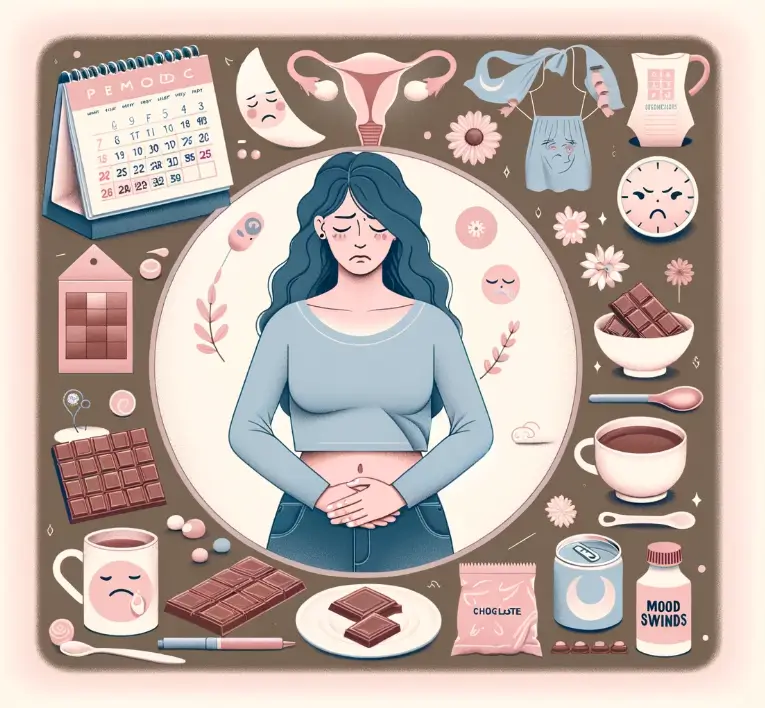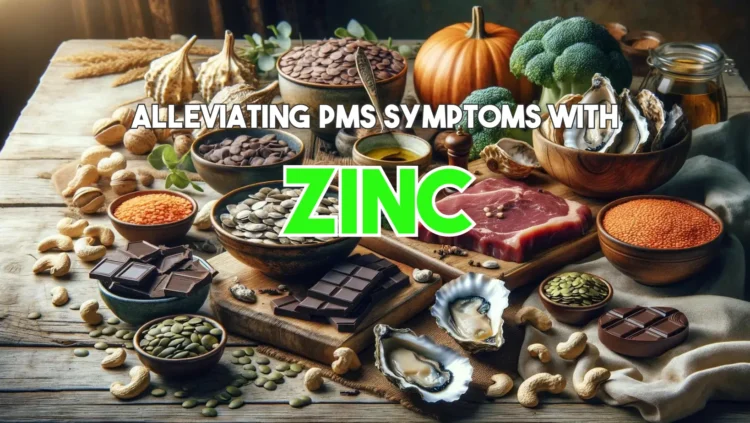Did you know that nearly 90% of individuals who menstruate experience some degree of premenstrual syndrome (PMS)? From mood swings to abdominal cramps, PMS symptoms can significantly impact a person’s well-being and quality of life. However, there is a natural remedy that may offer relief: zinc supplements.
Zinc has been found to play a crucial role in supporting hormonal balance and alleviating PMS symptoms. By incorporating this essential mineral into your routine, you can experience a reduction in cramps, bloating, mood swings, and other common PMS symptoms.
In this article, we will explore the benefits of taking zinc for PMS relief and provide natural remedies for managing your symptoms. Discover how you can ease the discomfort of PMS and regain control of your menstrual health with the help of zinc supplements.
Key Takeaways:
- Zinc supplements can help alleviate PMS symptoms naturally.
- 90% of individuals who menstruate experience some degree of PMS.
- Zinc supports hormonal balance and provides relief from cramps, bloating, mood swings, and more.
- Understanding PMS symptoms and incorporating zinc into your routine can improve your overall well-being during the menstrual cycle.
- Explore natural remedies and lifestyle changes that can further support a healthy period.
What is PMS?
PMS, or premenstrual syndrome, refers to a collection of symptoms that occur in the weeks leading up to a menstrual period. It is experienced by individuals who menstruate and can vary in severity from person to person.
PMS symptoms occur due to hormonal fluctuations during the menstrual cycle and can include:
- Cramps
- Bloating
- Mood swings
- Fatigue
These symptoms can disrupt daily life and impact emotional well-being. Understanding PMS is essential for effective management and relief of symptoms.
Normal Menstrual Cycle
Before diving deeper into PMS, it’s important to grasp the concept of a typical menstrual cycle. The menstrual cycle involves various hormonal changes that prepare the body for potential pregnancy. On average, a woman’s menstrual cycle lasts 28 days, although it can range from 21 to 35 days.
The cycle consists of two phases:
- Follicular phase: Occurs from the first day of the menstrual period until ovulation. During this phase, follicles in the ovaries mature, and estrogen levels rise.
- Luteal phase: Begins after ovulation and lasts until the start of the next menstrual period. During this phase, the ovary releases an egg, and progesterone levels increase.
If fertilization does not occur, hormone levels drop, leading to the shedding of the uterine lining, resulting in menstruation.
Now that we have a basic understanding of the menstrual cycle, let’s explore the symptoms and causes of PMS in more detail.
10 Common PMS Symptoms
PMS symptoms can manifest in various ways and may differ from month to month. Understanding these symptoms can help individuals identify and manage PMS effectively. Here are 10 common PMS symptoms:
- Abdominal cramps
- Bloating
- Breast tenderness
- Mood swings
- Irritability
- Skin issues
- Food cravings
- Headaches
- Hot flashes
- Fatigue
These symptoms can vary in intensity and duration, impacting individuals differently. Let’s take a closer look at each symptom:
- Abdominal cramps: These are often characterized by pain in the lower abdomen and can range from mild discomfort to severe cramping.
- Bloating: Many individuals experience bloating or a feeling of fullness in the abdomen, which can be accompanied by gas or water retention.
- Breast tenderness: Tender or swollen breasts are a common symptom of PMS and may cause discomfort.
- Mood swings: PMS can lead to shifts in mood, ranging from irritability and anxiety to sadness and depression.
- Irritability: Feelings of irritability or being easily agitated can occur due to hormonal changes during the menstrual cycle.
- Skin issues: Some individuals may experience acne breakouts or changes in their skin during PMS.
- Food cravings: Many people have intense cravings for certain foods, particularly sweets or salty snacks, during PMS.
- Headaches: PMS headaches can range from mild to severe and may be accompanied by tension or sensitivity to light and sound.
- Hot flashes: Some individuals may experience sudden sensations of heat, often accompanied by sweating or flushing.
- Fatigue: Feelings of tiredness or exhaustion can be common during PMS, making it important to prioritize rest and self-care.
By recognizing these common PMS symptoms, individuals can take proactive steps to manage their menstrual health and seek relief from discomfort and emotional changes.

Supplements to Ease PMS Symptoms
Incorporating supplements into your routine can provide much-needed relief from PMS symptoms. There are several highly recommended supplements for PMS relief, each with unique benefits. These supplements can help support hormonal balance, alleviate muscle tension, improve mood, and address various PMS symptoms. Consider adding the following supplements to your daily regimen:
- Zinc: Supports hormonal balance and immune system function. It can help reduce muscle tension and stabilize mood during PMS.
- Iron: Helps in maintaining energy levels and preventing fatigue commonly associated with PMS.
- B vitamins (such as B6 and B1): Aid in regulating hormone levels and reducing mood swings.
- Vitamin D: Plays a crucial role in mood regulation and can help alleviate PMS-related mood changes.
- Magnesium: Helps relax muscles and can relieve PMS cramps and muscle tension.
- Calcium: Supports muscle and nerve function, which can help reduce PMS-related muscle pain and discomfort.
- Vitamin E: Acts as an antioxidant and may help reduce breast tenderness and other PMS symptoms.
- Fatty acids (such as omega-3): Have anti-inflammatory properties and can aid in reducing PMS symptoms, particularly hormonal mood swings.
By incorporating these supplements into your daily routine, you can provide your body with the necessary nutrients to effectively manage and alleviate PMS symptoms.
What Causes PMS Symptoms? How Long Do They Last?
The exact cause of PMS symptoms is still unclear, but hormonal fluctuations during the menstrual cycle are believed to play a significant role. These fluctuations can affect individuals differently, resulting in varying levels of symptom severity. PMS symptoms typically occur a week or two before the period and may last until a few days into the period.
However, the duration of PMS symptoms can vary from person to person. While some individuals experience relief once their period starts, others may continue to experience symptoms throughout their menstrual cycle. In some cases, symptoms of PMS can persist until menopause.
It’s important to note that PMS symptoms can be influenced by factors such as genetics, lifestyle habits, and overall health. Keeping track of your symptoms and discussing them with a healthcare professional can help identify patterns and determine the best course of action for managing PMS.
Common Causes of PMS Symptoms
The underlying causes of PMS symptoms are still being studied, but researchers have identified several factors that may contribute to their development:
- Hormonal fluctuations: Changes in hormone levels, particularly estrogen and progesterone, have been associated with the onset of PMS symptoms.
- Chemical changes in the brain: Alterations in neurotransmitters, such as serotonin, have been implicated in mood swings and emotional changes during the premenstrual phase.
- Changes in brain sensitivity: Some studies suggest that individuals with PMS may have an increased sensitivity to hormonal fluctuations and neurotransmitter changes.
- Genetic predisposition: Family history of PMS or other mood disorders may increase the likelihood of experiencing severe PMS symptoms.
While these factors contribute to the development of PMS symptoms, it’s important to understand that every individual is unique, and the causes and severity of symptoms may vary. By tracking symptoms, understanding personal triggers, and adopting lifestyle changes, individuals can take steps towards managing PMS effectively.
Duration of PMS Symptoms
The duration of PMS symptoms varies from person to person. On average, symptoms can last anywhere from a few days to two weeks before the menstrual period. The intensity and duration of symptoms may change from cycle to cycle.
To better understand the duration of your symptoms, it can be helpful to track them in a journal or smartphone app. This way, you can identify patterns and anticipate when symptoms are likely to occur. Discussing your findings with a healthcare provider can provide valuable insights and aid in creating an individualized management plan.
| Duration of PMS Symptoms | Severity of Symptoms |
|---|---|
| Up to a week before the period | Mild to moderate |
| A couple of days before the period | Moderate to severe |
| During the period | May decrease or persist at a milder intensity |
Remember, everyone’s experience with PMS is unique, and it’s crucial to consult with a healthcare professional to determine the best course of action for managing your symptoms.
4 More Ways to Support a Healthy Period
In addition to supplements, making certain lifestyle changes can support a healthy period and alleviate PMS symptoms. These include:
- Maintaining a regular sleep schedule: Adequate sleep is essential for hormonal balance and overall well-being during the menstrual cycle. Aim for 7-9 hours of quality sleep each night.
- Eating a balanced diet rich in essential nutrients: A healthy diet plays a crucial role in supporting hormonal balance and reducing PMS symptoms. Include foods that are high in vitamins, minerals, and antioxidants:
| Food Group | Examples |
|---|---|
| Fruits and vegetables | Berries, leafy greens, citrus fruits |
| Whole grains | Quinoa, brown rice, oats |
| Lean proteins | Chicken, fish, tofu |
| Healthy fats | Avocado, nuts, olive oil |
| Calcium-rich foods | Dairy products, fortified plant-based milks |
- Regular exercise: Physical activity can help relieve PMS symptoms by increasing endorphin levels and reducing stress. Engage in activities such as brisk walking, yoga, swimming, or cycling for at least 30 minutes a day.
- Stress reduction techniques: Chronic stress can exacerbate PMS symptoms. Incorporate stress-relief practices into your daily routine, such as deep breathing exercises, meditation, journaling, or engaging in hobbies you enjoy.
By implementing these lifestyle changes, you can promote a healthy period and minimize the impact of PMS on your daily life.

The Role of Zinc and Other Supplements for PMS Relief
Zinc plays a crucial role in supporting hormonal balance and promoting overall well-being, making it a valuable supplement for relieving PMS symptoms.
By addressing key aspects such as muscle tension, mood stabilization, and immune system function, zinc can provide natural relief. However, it is important to note that other supplements, including calcium, magnesium, B vitamins, and omega-3 fatty acids, also contribute to PMS relief in their own ways.
When it comes to PMS, maintaining hormonal balance is essential for managing symptoms effectively. Zinc deficiency has been linked to worsened PMS symptoms, so ensuring an adequate intake of zinc through supplements or zinc-rich foods is essential.
By supporting muscle tension reduction, zinc can alleviate cramps and discomfort associated with PMS. Additionally, zinc plays a role in stabilizing mood and reducing irritability, a common symptom experienced during PMS.
Another benefit of zinc is its impact on the immune system. PMS symptoms can often be exacerbated by a weakened immune system, leading to increased susceptibility to illnesses and infections.
By bolstering immune system function, zinc can help prevent and mitigate these effects, allowing individuals to better manage their overall well-being during the PMS phase.
Natural Remedies for PMS
While zinc is a valuable supplement for PMS relief, it is important to consider a comprehensive approach to managing symptoms. The following table outlines other supplements that can contribute to PMS relief, addressing specific symptoms and promoting overall well-being:
| Supplement | Benefits |
|---|---|
| Calcium | Reduces mood swings and bloating |
| Magnesium | Relieves muscle tension and reduces irritability |
| B vitamins | Stabilizes mood and reduces fatigue |
| Omega-3 fatty acids | Reduces inflammation and supports brain health |
Adding these supplements to your routine, alongside zinc, can provide a holistic approach to managing PMS symptoms and supporting hormonal balance. However, it is always recommended to consult with a healthcare practitioner or nutritionist before starting any new supplements to ensure they are appropriate for your specific needs and health condition.
Including zinc and other beneficial supplements in your daily routine can help alleviate PMS symptoms naturally. By addressing muscle tension, stabilizing mood, and boosting immune system function, these supplements provide relief and support hormonal balance.
Remember to prioritize a healthy lifestyle, including a balanced diet, regular exercise, and stress management techniques, to further enhance the effectiveness of these natural remedies for PMS.
Conclusion
Taking zinc supplements is a natural and effective way to alleviate PMS symptoms. By incorporating zinc and other beneficial supplements into your routine, you can support your body through hormonal fluctuations, reduce muscle tension, improve mood, and experience relief from common PMS symptoms.
Understanding PMS, its symptoms, and the role of supplements empowers you to take control of your menstrual health and find natural remedies for PMS relief.
Zinc plays a crucial role in maintaining hormonal balance and supporting overall well-being during the menstrual cycle. Its benefits include muscle tension reduction, mood stabilization, and immune system function.
Alongside zinc, calcium, magnesium, B vitamins, and omega-3 fatty acids also contribute to PMS relief by addressing specific symptoms and promoting overall well-being.
By embracing a comprehensive approach that includes natural remedies and lifestyle changes, you can effectively manage PMS and promote a healthy period. Regular sleep, a balanced diet rich in essential nutrients, exercise, and stress reduction techniques all contribute to hormonal balance and overall well-being.
Through these means, you can experience long-lasting relief from PMS symptoms and regain control of your menstrual health.
FAQ
Can taking zinc alleviate PMS symptoms?
Yes, zinc supplements have been found to be beneficial in relieving PMS symptoms. Zinc supports muscle tension reduction, mood stabilization, and immune system function, providing relief from common PMS symptoms.
What is PMS?
PMS, or premenstrual syndrome, refers to a collection of symptoms that occur in the weeks leading up to a menstrual period. It is experienced by individuals who menstruate and can include cramps, bloating, mood swings, and fatigue.
What are 10 common PMS symptoms?
Common PMS symptoms include abdominal cramps, bloating, breast tenderness, mood swings, irritability, skin issues, food cravings, headaches, hot flashes, and fatigue.
Are there supplements to ease PMS symptoms?
Yes, there are several supplements that can help alleviate PMS symptoms. Some recommended supplements for PMS relief include iron, B vitamins (such as B6 and B1), vitamin D, magnesium, zinc, calcium, vitamin E, and fatty acids (such as omega-3).
What causes PMS symptoms? How long do they last?
The exact cause of PMS symptoms is still unclear, but hormonal fluctuations during the menstrual cycle are believed to play a significant role. PMS symptoms typically occur a week or two before the period and may last until a few days into the period. The duration can vary from person to person, and symptoms may persist until menopause.
What are 4 more ways to support a healthy period?
To support a healthy period, it is important to maintain a regular sleep schedule, eat a balanced diet rich in essential nutrients, engage in regular exercise, and practice stress reduction techniques. These lifestyle changes can contribute to hormonal balance and overall well-being during the menstrual cycle.
What is the role of zinc and other supplements for PMS relief?
Zinc, along with other supplements such as calcium, magnesium, B vitamins, and omega-3 fatty acids, plays a crucial role in supporting hormonal balance and providing relief from specific PMS symptoms. Incorporating these supplements into one’s routine can alleviate muscle tension, improve mood, and support overall well-being.
How can zinc benefit PMS relief?
Zinc has been found to be particularly beneficial in relieving PMS symptoms. It supports muscle tension reduction, mood stabilization, and immune system function. By taking zinc supplements, individuals can experience relief from common PMS symptoms and support their bodies through hormonal fluctuations.




